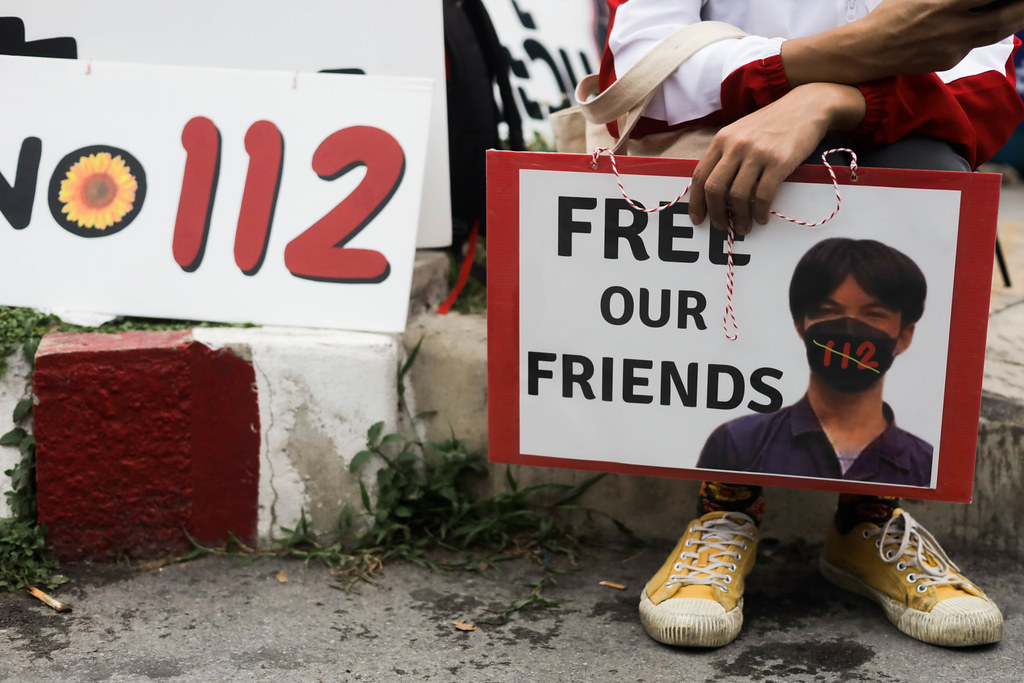On 8 June 2022, CIVICUS, an alliance for citizen participation and Asia democracy network are alarmed by the ongoing judicial harassment against youth pro-democracy activists in Thailand for exercising their rights to expression and peaceful assembly.

A file photo of a rallying banner against the detention of activists and political dissidents.
As the State Party to the International Covenant on Civil and Political Rights (ICCPR), Thailand should guarantee an enabling environment for the public, including human rights defenders and activists, to convey their legitimate criticism instead of criminalising them.
Two youth pro-democracy activists, Netiporn 'Bung' Sanesangkhon and Nutthanit' Bai Por' Duangmusit, were detained on 3 May 2022 after the Court revoked their bail for their involvement in conducting two polls on the monarchy in February and March 2022. Their requests for bail have been denied.
Recently, the Court granted bail for two other youth activists facing royal defamation charges (Section 112 or lèse majesté). Activist, Tantawan 'Tawan' Tuatulanon, was granted bail on 26 May 2022 but ordered to wear a monitoring device and not leave her house premises without a court order.
Tawan is known for her affiliation with the pro-democracy Draconis Revolution group, continuously advocating to abolish Section 112 (lèse majesté). She was detained in March 2022 for questioning the monarchy in a live streaming broadcast on social media and faces five counts of resisting officers in the execution of their duty, violating the Computer Crimes Act and royal defamation.
While she was initially given bail, it was revoked on 20 April 2021 after the police claimed that she had attempted to commit a similar offence following a Facebook post commenting about a royal motorcade and going near the motorcade. Following the prolonged detention by the Court, she went on a 30-day hunger strike. On 20 May, the Ratchadaphisek Criminal Court denied her bail again after prosecutors said they had just received a case file.
The other activist, Sophon 'Get' Surariddhidhamrong was arrested on 1 May 2022 for giving a critical speech during a protest march in the Ratchadamnoen area 10 days earlier. He was denied bail by the South Bangkok Criminal Court and was on a hunger strike for 22 days before the bail was granted on 31 May. He faces two other royal defamation charges for his speeches in the Chakri Memorial Day Protest in April and the Labour Day rally on 1 May. Despite being granted bail, the royal defamation charges against Tawan and Get remain.
The cases add to the long list of prosecution under Section 112, which the Thailand Prime Minister revived in 2020 after not being used for three years. Statistics from the Thai Lawyer for Human Rights (TLHR) have revealed that at least 190 individuals had been subjected to royal defamation charges between 18 July 2020 and 30 April 2022.
At this time, apart from the activists mentioned, there are others who have been detained and awaiting trial in both the royal defamation case and other cases. Also, two activists, Ekkachai Hongkangwan and Sombat Thongyoi, who have been sentenced to imprisonment are currently in the appeal process.
The royal defamation charges are not the only law the Thailand government has used to stifle fundamental freedoms such as the freedom of expression and peaceful assembly. Other draconian provisions used include sedition charges under Section 116, charges under the Emergency Decree, charges under the Public Assembly Act, Computer Crime Act, and Contempt of Court, to name a few.
The prolonged pre-trial detention under the royal defamation charge violates Thailand's international human rights obligation under the ICCPR. Article 9 of the Covenant stipulates the State Party's obligation to conduct a trial on criminal offences within a reasonable time. Detention for those awaiting trial should not be mandatory for all defendants charged with a particular crime. Further, the state is obligated to re-examine if the pretrial detention has to be continued, whether it is reasonable and necessary for lawful purposes in the light of possible alternatives. The arrest or detention of legitimate activities of exercising guarantees rights, such as freedom of expression, is considered arbitrary.
Our organisations call for the immediate and unconditional release of these activists and for the government to guarantee a safe and enabling environment for Thai people to express their opinion without fear of reprisal. This includes abolishing provisions and laws, including on royal defamation and sedition charges which are often used to stifle critics.
Civic space in Thailand is rated as "Repressed" by the CIVICUS Monitor
Prachatai English is an independent, non-profit news outlet committed to covering underreported issues in Thailand, especially about democratization and human rights, despite pressure from the authorities. Your support will ensure that we stay a professional media source and be able to meet the challenges and deliver in-depth reporting.
• Simple steps to support Prachatai English
1. Bank transfer to account “โครงการหนังสือพิมพ์อินเทอร์เน็ต ประชาไท” or “Prachatai Online Newspaper” 091-0-21689-4, Krungthai Bank
2. Or, Transfer money via Paypal, to e-mail address: [email protected], please leave a comment on the transaction as “For Prachatai English”
